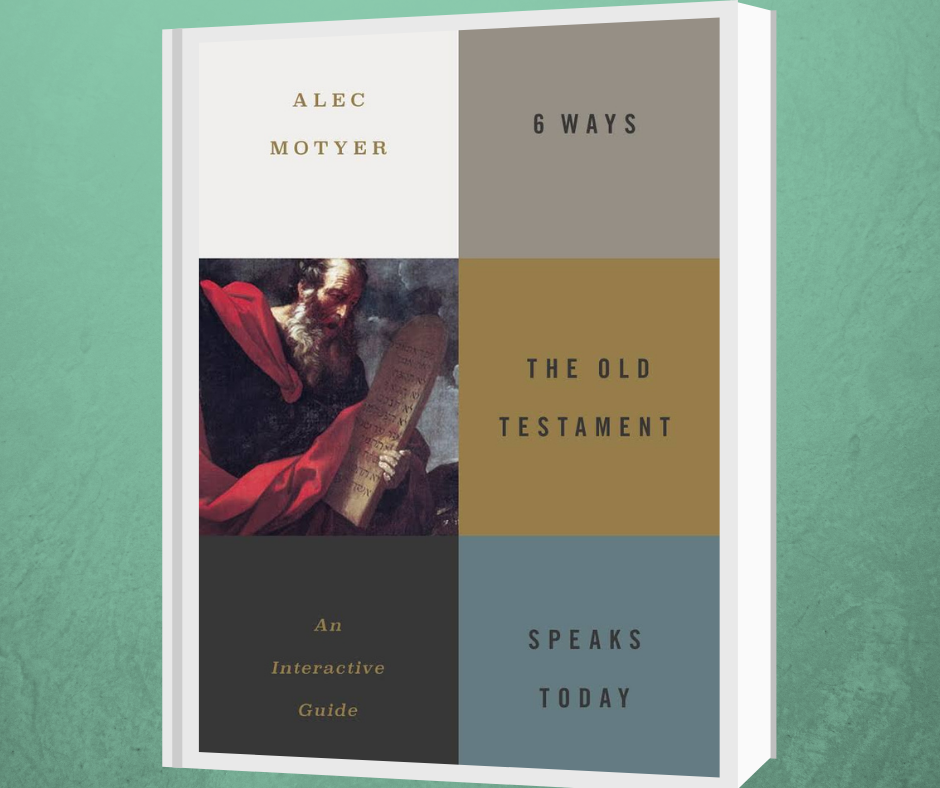Book Reviews
6 Ways the Old Testament Speaks Today: An Interactive Guide, by Alec Motyer | Review by Rosa Byler

To many Christians, much of the Old Testament seems puzzling and intimidating, its events distant and its characters colorful but unrealistic, like children’s summer Bible school pictures. We enjoy (most of) the psalms, benefit from the practical wisdom in Proverbs, appreciate prophetic passages that fit our eschatology, and illustrate morality from a few choice stories.
Yet we don’t quite know what to do with men of God who shed blood, drank wine, committed adultery, danced immodestly before the Lord, or gave themselves bizarre haircuts and cooked food over dried manure. Too frequently we conclude with relief that there is “no need to bother about the Old [Testament] when we are people of the New.” (13)
Pastor and Bible scholar Alec Motyer disagrees. The OT is “a spectacular piece of countryside, full of interest, and (wonderfully) speaking directly to us, our situations, and our needs.” (13) Motyer identifies six themes or “voices” heard throughout the OT—history, religion, worship, prophecy, wisdom, and God—and illustrates each one with six Scripture readings and brief notes.
OT history is the narrative of God at work in His world to bring about His purposes. It is reliable, as attested to by Jesus; selective in its use of detail but always connecting a nation’s fortunes to its standing with God; and faithfully moral—even its best characters are portrayed with their lusts, ambitions, cruelties, and mistakes. OT history records continual human failure and the longing and prayer for the Messiah, the King who would not fail His people.
OT religion focused on sacrifice and God’s presence with his people. The Passover, initiated before the tabernacle’s detailed prescriptions for sacrifice, illustrated three core elements of atonement: the satisfaction of God’s holiness, the resulting safety for the obedient, and the explanation of both in the principle of substitution. Worship under the sacrificial system was not, as we might think, exemplified by the Pharisees, who were “joyless…carping, critical, laden with the dust of man-made tradition” and actually heretics (see Matthew 15). Motyer points out that the Psalms much more accurately picture the “joyousness, delight, and spiritual confidence” of old-covenant worship.
In the proclamation of who God is and what He requires, OT prophecy frequently involved foretelling the future. Motyer describes prophets as “expositors and appliers,” bringing fresh relevance and contemporary applications (often aided by dramatic visuals) to the body of truth that God’s people so easily forgot. This chapter uses examples from the prophets’ writings to shed further light on “the mystery of verbal inspiration…which the Bible never explains.” (80)
The wisdom books contain the greatest concentration of the contrast between good and evil, wise and foolish, scoffers and those who fear the Lord. Proverbs is full of “sheer fun…sharp observations of life and apt illustrations.” Job examines the problem of undeserved suffering; Ecclesiastes paints a dark picture yet concludes that those who seek God will “live the life of faith [even] in a world that does not add up.” And in the face of life’s perplexities, vanities, and unexplained tragedies, the Song of Solomon commends “deep relationship and committed love” as a place of rest, peace, and delight. (112)
Motyer saves the best theme for last: God Himself. The OT is not so much the record of our searching for and finding God as it is the story of His coming to tell us about Himself. It is as if, instead of Columbus “discovering America,” Native Americans had crossed the ocean to tell the Old World about themselves and their land. (121) Motyer uses the familiar terms “progressive” and “cumulative” revelation; but he also describes the God of the OT as “the trinity incognito,” with the NT bringing the final adjustment and sharp focus to the picture. (127)
Although Motyer is considered one of the greatest evangelical OT scholars of the last hundred years, his style is far from ponderously academic. His infectious love for the OT will kindle interest even in ordinary and heretofore reluctant readers. Motyer’s thorough knowledge of the material and pastoral experience as well as his sense of humor and apt illustrations make the book a pleasure to read—a devotional/theological resource that merits re-reading.